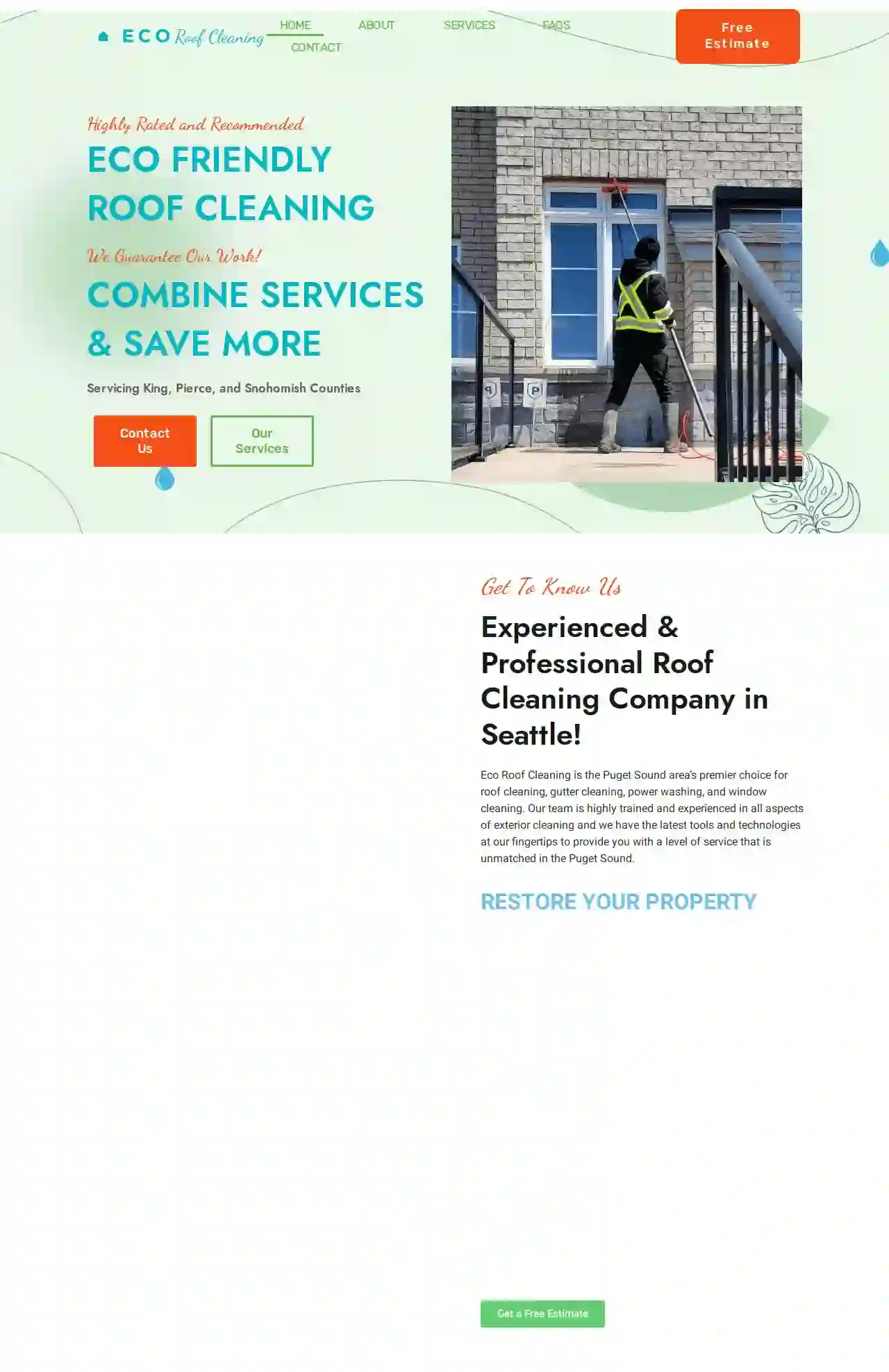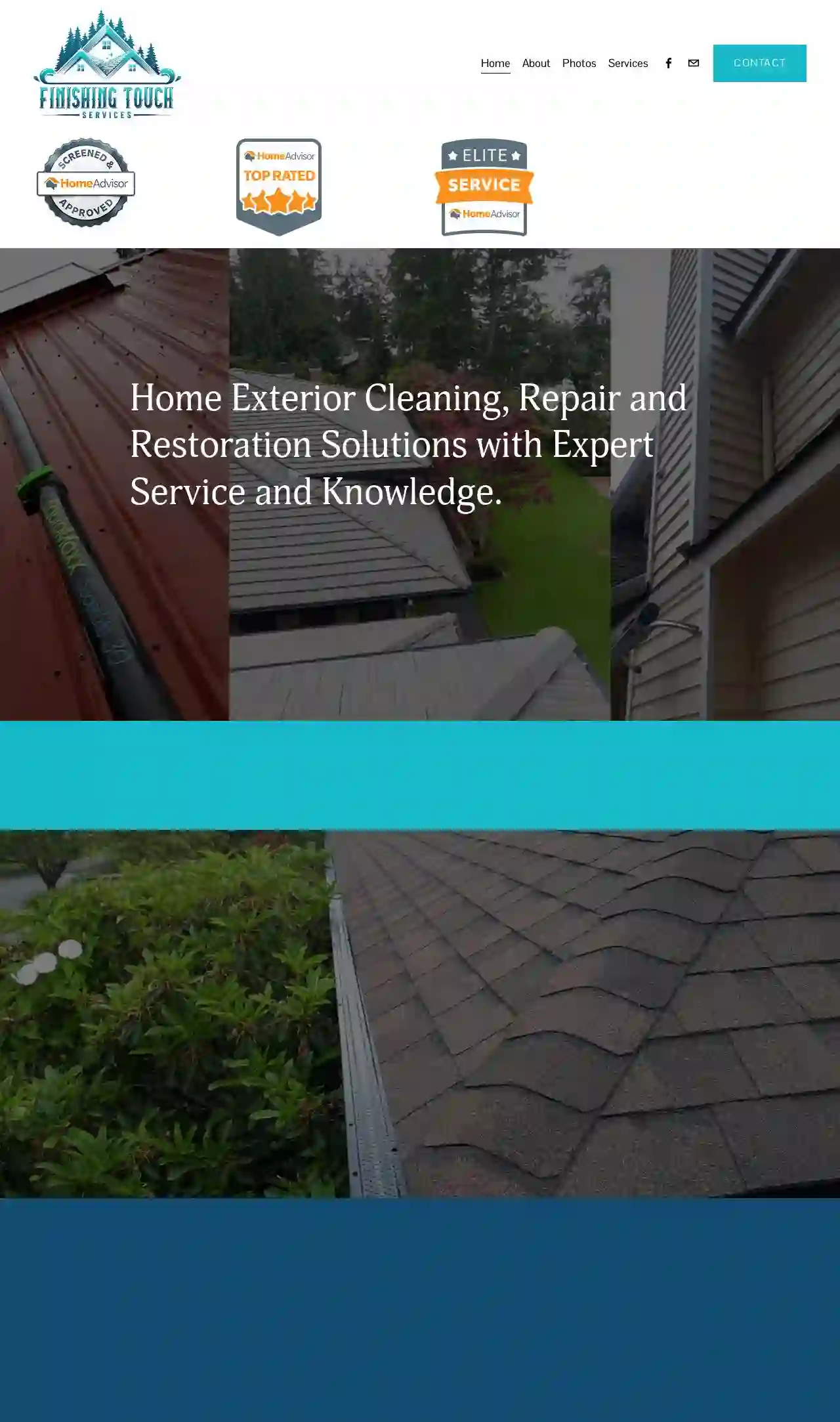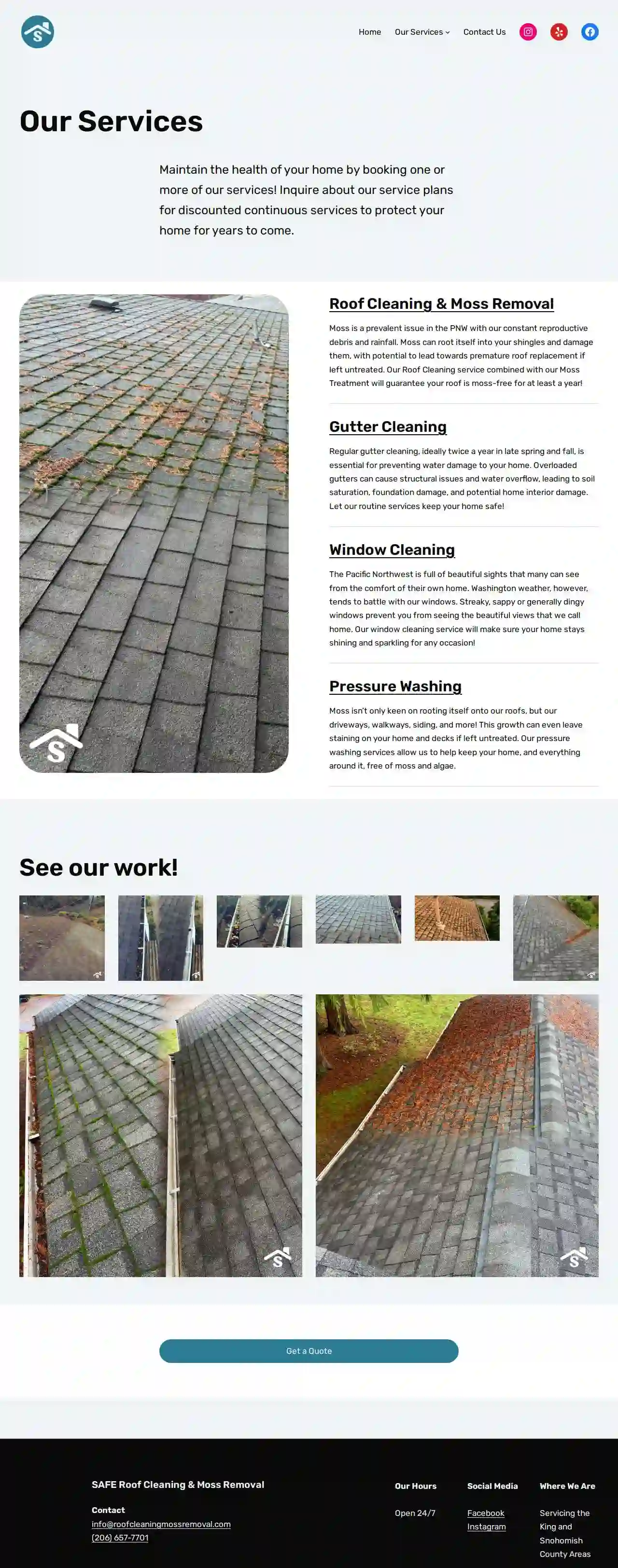Gutter Cleaning Grandview
Find the best Roof Gutter Cleaning in Grandview
Receive up to 3 Gutter Cleaning quotes for your project today! Compare profiles, reviews, accreditations, portfolio, etc... and choose the best offer.

Eco Roof Cleaning
4.9111 reviewsSeattle, USEco Roof Cleaning is the Puget Sound area’s premier choice for roof cleaning, gutter cleaning, power washing, and window cleaning. Our team is highly trained and experienced in all aspects of exterior cleaning and we have the latest tools and technologies at our fingertips to provide you with a level of service that is unmatched in the Puget Sound. We use a soft brush to clean your roof, which is the recommended method to preserve its integrity. We offer eco-friendly cleaning products for your gutters, siding, and other surfaces. We also offer pressure washing for driveways, building structures, house patios, stairs and more! We use safe equipment and cleaning techniques to clean windows effectively. Maximize Solar production with regular cleaning and maintenance.
- Services
- Why Us?
- Our Team
- Testimonials
- Gallery
Get Quote
Great American Gutters
528 reviewsSnohomish, 98296, USGreat American Gutters is a family-owned and operated business serving Snohomish, WA and the surrounding areas, including King County, Snohomish County, Skagit County, Shoreline, Kirkland, Woodinville, and Bellevue. Founded by Robert Shairrick, a 22-year veteran, the company was started to provide honest and quality gutter services at fair prices. We specialize in a wide range of services, including gutter installation, repair, cleaning, guard installation, replacements, and roof cleaning. Our team of highly skilled professionals is dedicated to providing exceptional service and ensuring customer satisfaction. We pride ourselves on our local knowledge, quality commitment, and expertise in the latest industry trends and techniques.
- Services
- Why Us?
- Our Team
- Gallery
Get Quote
Finishing Touch Services
531 reviewsSeattle, USFinishing Touch Services is a small family owned business offering home exterior cleaning services in Port Orchard, WA and the rest of Kitsap County along with Pierce county here in Washington State. Our main services include Roof Cleaning, Gutter & Roof Installations , House Washing/Painting for both residential and commercial buildings. Our goal is to continue to grow our business while maintaining top quality workmanship and expand the care and services we provide to our clients. We believe transparency and reliability are key to a successful business - client relationship. Please call or click to get a Quote.
- Services
- Why Us?
- Gallery
Get Quote
Fresh start gutter cleaning llc
1000 Peachtree St NE, Suite 1000, Atlanta, 30349, USFresh Start Gutter Cleaning is a locally owned and operated business serving the greater Atlanta area. We are dedicated to providing high-quality gutter cleaning services to residential and commercial clients. Our team of experienced professionals uses the latest equipment and techniques to ensure that your gutters are clean and free of debris. We understand the importance of maintaining clean gutters for the health and safety of your home or business. Clogged gutters can lead to water damage, foundation problems, and pest infestations. That's why we offer a comprehensive gutter cleaning service that includes: Thorough gutter cleaning: We remove all leaves, twigs, dirt, and other debris from your gutters. Downpipe inspection and cleaning: We check your downpipes for clogs and ensure they are flowing freely. Gutter guard installation: We offer a variety of gutter guard options to help prevent future clogs. We are fully insured and bonded, so you can rest assured that your property is in good hands. We also offer competitive pricing and flexible scheduling. Contact us today for a free estimate!
- Services
- Why Us?
Get Quote
Sterling Wash
542 reviewsKent, USSoft Washing in Mt. Sterling, KY 859.585.3714 Sterling Wash, your go-to company for exceptional soft and pressure washing services, is proud to serve the vibrant community of Mt. Sterling, KY! At Sterling Wash, we take great joy in transforming your exteriors back to their sparkling glory. Our team of highly skilled technicians is equipped with state-of-the-art soft and pressure washing equipment to tackle any surface with remarkable precision. What We do Soft washing technology is a low pressure, solution based cleaning. Using only safe, industry standard solutions, Soft Washing is a gentle, safe alternative to traditional, high pressure exterior cleaning. Sterling Wash is your local, Soft Wash experts! Why is soft washing the best washing solution? Discover the incredible cleaning power of Sterling Wash’s soft washing technique. Say goodbye to harsh chemicals and high pressure water blasting, and hello to a gentle yet effective cleaning method that will transform your home or business. Soft washing utilizes a specialized biodegradable detergent combined with low-pressure water application to safely remove dirt, grime, mold, mildew, and algae from any surface. Unlike traditional pressure washing methods, soft washing doesn’t cause damage or deterioration to delicate surfaces such as roofs, siding, decks, or even windows. The innovative technology behind Sterling Wash’s soft washing ensures that every nook and cranny is thoroughly cleaned without causing any harm. This makes it the perfect choice for cleaning sensitive materials like wood or vinyl without worrying about potential chips or cracks caused by high pressure streams of water. Why Sterling Wash is the Best Choice ✓ State of the Art Equipment ✓ On-Time Service ✓ Convenient Payment Options Testimonials What Our Customers Say He is prompt, fabulous conversation and perfection when the job is done Liz T.2/09/2024 Another excellent experience and I am so grateful they could work around our busy schedule!! Even went above and beyond with maintenance cleaning before they got started. It’s the little details that show how well these guys care for their customers and will go above and beyond each time with their work. All of us at Cattleman’s Roadhouse appreciate your wonderful business! Nicole W.12/11/2023 These guys are great! Super professional and very knowledgeable. Mike suggests alternative ways to clean tough services. I was so impressed by his desire to clean my house and return it to its original luster. Bash B.11/04/2023 The only place I would reccomend. Chris E.10/22/2023 Sterling Wash provided excellent results. Recommend highly for your needs. Loretta G.10/19/2023
- Services
- Why Us?
- Accreditations
- Our Team
- Testimonials
- Gallery
Get Quote
Gutter Magician
3.759 reviews519 Enterprise Dr. Suite 104, Erlanger, 41017, USWelcome to Gutter Magician, your trusted local gutter experts serving Northern Kentucky, Cincinnati, and surrounding areas. We are a family-owned and operated business with over 22 years of experience providing high-quality gutter installation, replacement, and protection services. Our mission is to deliver exceptional customer service, top-notch products, and professional workmanship. We are committed to exceeding your expectations and ensuring your complete satisfaction. At Gutter Magician, we understand the importance of properly functioning gutters for protecting your home from water damage. That's why we offer a wide range of services, including seamless gutter installation, gutter replacement, gutter covers, and more. Our team of experienced professionals uses only the highest quality materials and techniques to ensure a durable and reliable solution for your gutter needs. We are proud to be a trusted name in the industry, serving thousands of satisfied customers throughout the region. Our commitment to quality, customer service, and integrity has earned us a reputation for excellence. Contact us today for a FREE, no-obligation estimate and let Gutter Magician take care of your gutter needs.
- Services
- Why Us?
- Accreditations
- Our Team
- Testimonials
- Gallery
Get Quote
SAFE Roof Cleaning Moss Removal and Gutter Cleaning
59 reviewsTacoma, USKeeping your greatest investment SAFE! Get a Quote (206) 657-7701 Roof Cleaning Gutter Cleaning Window Cleaning Pressure Washing Professional PNW Experts The Pacific Northwest requires us homeowners to constantly stay on top of gutter cleaning, roof cleaning, and everything in between. With consistent rain and wind we endure from fall to spring, keeping your home’s gutters and roof systems well maintained is vital to the safety of your home and it’s foundation. Our routine maintenance plans will keep your gutter system running smooth, and the roof over your head SAFE and sound. Get a Quote Why choose SAFE? We are dedicated experts in our field with years of experience in taking care of residential and commercial properties. We give your home the personal care it deserves, and treat every customer’s home as if it was our very own! We pride ourselves in delivering excellent customer care. We are committed to delivering excellent service by catering to your needs- our crew honors your schedule and we get the job done efficiently so you can continue your day with peace of mind. Our teams and crew are well trained and equipped to get the job done- assuring you that you are working with the best crew in the industry. Get a free quote today and keep your home SAFE! Get a Quote
- Services
- Why Us?
- Gallery
Get Quote
Gibson Roof, Gutter and Window Cleaning
55 reviewsSeattle, USGibson Roof, Gutter and Window Cleaning is a fully licensed and insured company with over 10 years of experience in the field. We pride ourselves in taking a detailed and methodical approach to our work and our clients love it. We're a fully licensed and insured company with over 10 years of experience in the field. The safest, easiest, and most effective choice you can make! Let us refresh and preserve the exterior of your home. We love to keep your gutters flowing, your roof free of moss and debris and your windows sparkling clean. For us it's fun. Nothing beats stepping back and seeing a newly cleaned and functioning roof.
- Services
- Why Us?
- Our Team
- Testimonials
- Gallery
Get Quote
Upward Prowash (I) - Roof & House Soft Wash, Pressure Washing, Gutter Cleaning
4.822 reviewsRichmond, USAt Upward Prowash, we take your investment seriously. We offer superior services that will protect your important investment... Today and into the future. Our goal is to provide the best service to our customers. We do this by enhancing curb appeal, boosting quality, and securing the longevity of your property. Combining the best technology and cleaning agents on the market with our professional expertise, we're proud to be a reliable resource for all your needs. We provide service to the following counties: Madison, Estill, Clark, Fayette, Jessamine, Garrard, Boyle. Our service area includes Pressure Washing Richmond KY, Roof Cleaning Richmond KY, Concrete Cleaning Richmond KY, Power Washing Richmond KY, Pressure Washing Lexington KY, Roof Cleaning Lexington KY, Concrete Cleaning Lexington KY, Power Washing Lexington KY, Pressure Washing Winchester KY, Roof Cleaning Winchester KY, Concrete Cleaning Winchester KY, Power Washing Winchester KY, Pressure Washing Berea KY, Roof Cleaning Berea KY, Concrete Cleaning Berea KY, Power Washing Berea KY, Pressure Washing Irvine KY, Roof Cleaning Irvine KY, Concrete Cleaning Irvine KY, Power Washing Irvine KY. We offer Soft Wash House Washing, which is a safe and effective process used by professional pressure washing companies for cleaning a variety of exterior surfaces on buildings and homes. We also offer Soft Wash Roof Cleaning, which can rid you of your ugly roof problem in Madison, Estill, and surrounding counties.
- Services
- Why Us?
- Our Team
- Gallery
Get Quote
Refyne Exteriors - Roof & Gutter Cleaning
5140 reviewsAuburn, 98001, USMaintaining a home or business in the Auburn area is hard work. Our infamous amount of rainfall and climate are part of the charm of living and working here, but they can also wreak havoc on buildings, driveways, sidewalks, and gutters. You could try to keep up with the battle against the elements and time as they try to slowly destroy your property. You could spend large amounts of your hard-earned money buying pressure washer equipment and chemicals to do it yourself, and then find a place to store it all to keep it safe until you need it next. You could tie up more of your precious free time on chores that will pull you away from things you enjoy. You could miss out on opportunities to spend time with friends and family to clean. Or... You could hire an affordable and efficient team of pressure washing professionals from Refyne Pressure Washing. We are the best company for pressure washing in Auburn. And we know you'll agree. Select Auburn's Top Pressure Washer Our years of experience and dedication to getting each job done the right way are what make us stand out above the competition. We offer a wide range of services from home washing to commercial pressure washing. It is our mission to make your home or business look great and your life easier. We guarantee it, or your money back. Call Refyne Pressure Washing at 253-347-5859 today for a free estimate pressure washer in Auburn.
- Services
- Why Us?
- Our Team
- Gallery
Get Quote
Over 60,241+ Janitorial Services on our platform
Our cleaning companies operate in Grandview and surroundings!
CleaningMatch has curated and vetted Top Cleaning Services arround Grandview. Find the most trustworthy business today.
Frequently Asked Questions About Gutter Cleaning
- Visible Debris: You can see leaves, twigs, and other debris accumulated in your gutters from the ground.
- Sagging Gutters: Gutters that are filled with debris become heavy and can sag or pull away from the house.
- Water Overflowing: During rainfall, water spills over the sides of your gutters instead of flowing through the downspouts.
- Water Stains: Water stains on your siding or foundation indicate that your gutters are overflowing.
- Plant Growth: Plants or moss growing in your gutters indicate standing water and a lack of proper drainage.
- Aluminum: A popular choice due to its affordability, durability, and resistance to rust. Available in seamless and sectional varieties.
- Vinyl: Lightweight, inexpensive, and easy to install. Less durable than aluminum and can become brittle in extreme temperatures.
- Steel: Strong and durable but prone to rust if not galvanized or coated.
- Copper: High-end and aesthetically pleasing, known for its longevity and resistance to corrosion. More expensive than other gutter materials.
- Zinc: Durable and long-lasting, with a distinctive patina that develops over time. More expensive than aluminum but less expensive than copper.
- Small House: Cleaning gutters on a small, single-story house may take 1-2 hours.
- Large or Multi-Story House: Cleaning gutters on a larger or multi-story house can take 3-4 hours or more.
- Hand Cleaning: Involves manually removing debris from gutters using gutter scoops, trowels, and other hand tools. It's effective for removing larger debris but can be time-consuming.
- Blowing: Uses blowers to remove leaves and debris from gutters. Effective for lighter debris but may not remove heavier or compacted materials.
- Vacuuming: Employs specialized gutter vacuums to suck up debris. Effective for removing both dry and wet debris, but may require specialized equipment.
- Pressure Washing: Uses pressure washers to flush out gutters and downspouts. Effective for removing stubborn debris but requires careful handling to avoid damaging gutters.
How do I know if my gutters need cleaning?
If you notice any of these signs, it's time to schedule a gutter cleaning.
What are the different types of gutter materials?
The best gutter material for your home depends on your budget, climate, and aesthetic preferences. Consult with a gutter professional to determine the most suitable option for your needs.
How long does it take to clean gutters?
Additional services like gutter repair or gutter guard installation will add to the overall time required.
What are the different types of gutter cleaning methods?
The best gutter cleaning method depends on the type of gutters, the amount and type of debris, and the gutter cleaner's preferences. Discuss your options with a professional gutter cleaning service to determine the most suitable method for your needs.
How do I know if my gutters need cleaning?
- Visible Debris: You can see leaves, twigs, and other debris accumulated in your gutters from the ground.
- Sagging Gutters: Gutters that are filled with debris become heavy and can sag or pull away from the house.
- Water Overflowing: During rainfall, water spills over the sides of your gutters instead of flowing through the downspouts.
- Water Stains: Water stains on your siding or foundation indicate that your gutters are overflowing.
- Plant Growth: Plants or moss growing in your gutters indicate standing water and a lack of proper drainage.
If you notice any of these signs, it's time to schedule a gutter cleaning.
What are the different types of gutter materials?
- Aluminum: A popular choice due to its affordability, durability, and resistance to rust. Available in seamless and sectional varieties.
- Vinyl: Lightweight, inexpensive, and easy to install. Less durable than aluminum and can become brittle in extreme temperatures.
- Steel: Strong and durable but prone to rust if not galvanized or coated.
- Copper: High-end and aesthetically pleasing, known for its longevity and resistance to corrosion. More expensive than other gutter materials.
- Zinc: Durable and long-lasting, with a distinctive patina that develops over time. More expensive than aluminum but less expensive than copper.
The best gutter material for your home depends on your budget, climate, and aesthetic preferences. Consult with a gutter professional to determine the most suitable option for your needs.
How long does it take to clean gutters?
- Small House: Cleaning gutters on a small, single-story house may take 1-2 hours.
- Large or Multi-Story House: Cleaning gutters on a larger or multi-story house can take 3-4 hours or more.
Additional services like gutter repair or gutter guard installation will add to the overall time required.
What are the different types of gutter cleaning methods?
- Hand Cleaning: Involves manually removing debris from gutters using gutter scoops, trowels, and other hand tools. It's effective for removing larger debris but can be time-consuming.
- Blowing: Uses blowers to remove leaves and debris from gutters. Effective for lighter debris but may not remove heavier or compacted materials.
- Vacuuming: Employs specialized gutter vacuums to suck up debris. Effective for removing both dry and wet debris, but may require specialized equipment.
- Pressure Washing: Uses pressure washers to flush out gutters and downspouts. Effective for removing stubborn debris but requires careful handling to avoid damaging gutters.
The best gutter cleaning method depends on the type of gutters, the amount and type of debris, and the gutter cleaner's preferences. Discuss your options with a professional gutter cleaning service to determine the most suitable method for your needs.